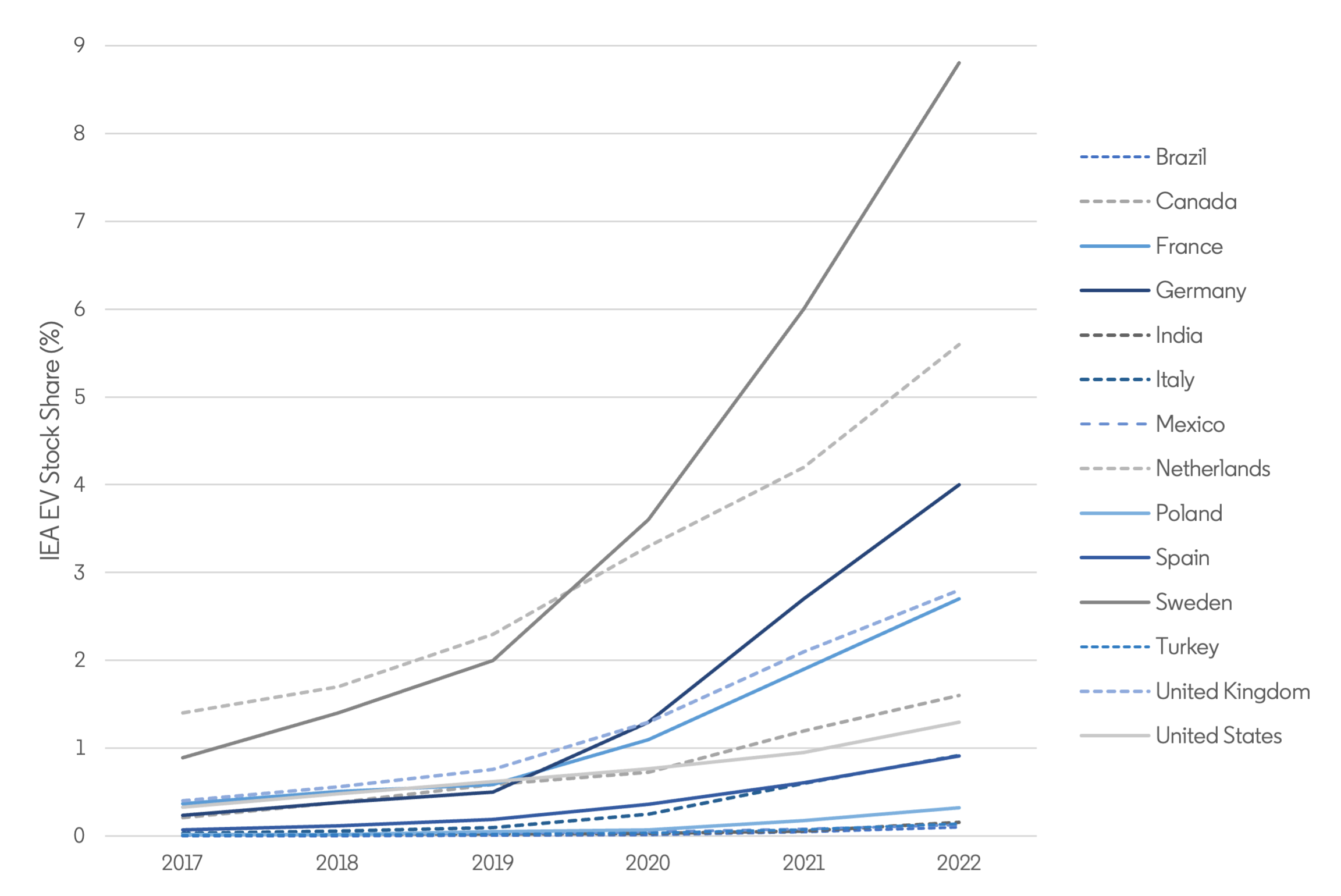
Accelerating the Transition to Electric Vehicles
The race to green our transportation systems is on, and the transition to electric vehicles (EVs) in the automotive industry is one of the most exciting frontiers of this transition. The latest Global EV Outlook Report from the International Energy Agency (IEA) states that EV sales exceeded 10 million in 2022 with 14% of all new cars sold being electric in 2022, up from around 9% in 2021 and less than 5% in 2020.
The growth in the stock share of EV cars is an encouraging sign, and through Economic Graph data, we are observing evidence that the proliferation of EV skills in the labor market is accompanying this transition:
IEA EV stock share by country (cars only)

Source: International Energy Agency Global EV Outlook Report 2023
Share of automotive industry LinkedIn members with >= 1 EV skill

Akin to IEA data, we are seeing Sweden’s automotive industry lead the way in employing members with EV skills with nearly one out of every 12 automotive workers in the country possessing at least one EV related skill. As EVs gain popularity, other countries are also making up ground - there was 12% year-over-year increase from 2022 to 2023, in the share of EV Skilled Workforce in the automotive industry in Canada. Between 2017 and 2023, India has seen the highest average yearly increase in its EV Skilled automotive workforce, increasing by 21% each year from 1.7% in 2017 to over 5% in 2023. With the Mercedes-Benz Research and Development facility in India set to hire nearly 1K engineers in 2023 we can expect to see India solidify its position as a crucial technology hub in the transition to EVs.
It must be remembered that the stock of EV cars is growing from a low base, often from less than 1% in most countries. However, the growth in both the stock of such cars as well as the members with skills required to produce them is on an upward trend point to an accelerating transition. This is borne out in the data with typical (median) yearly increases of 62% for stock share of EVs and 11.3% for EV Skilled automotive members (annualized average) amongst the countries we analyzed.
Large automotive manufacturers concentrate the most on specialized EV talent
To understand the role of large automotive manufacturers, we considered the “EV-fication” of their workforce and products in two different ways:
The share of EV skilled members at large automotive manufacturers vs. other companies in the industry which allows us to measure the extent to which these companies are monopolizing EV related talent that is critical to the aforementioned transition.
The percent of the workforce of large automotive manufacturers that is EV skilled, which allows us to understand the extent to which large companies are dedicating resources towards the transition to EVs.
While large automakers employ 18% of all automotive professionals on our platform, they employ 26% of EV skilled professionals indicating that they are highly focused on this transformation. In the United States, 31% of all EV Skilled members in the automotive industry work at a large automotive manufacturer. In Germany, this share is slightly lower at 27% with over 70% of EV Skilled automotive industry professionals working at a smaller company.
Strong momentum to green commercial transportation
Both in the United States and Germany, we also see heavy vehicle (trucks, buses etc.) companies employing EV skilled professionals. This is important because while converting cars to electric will reduce emissions, a non-trivial portion of emissions comes from freight, shipping, and aviation. Reducing these emissions will move us closer to making carbon-neutral transportation a reality.
Global CO2 emissions from transport

Source: Our World in Data based on International Energy Agency (IEA) and International Council on Clean Transportation (ICCT) 2018
Passenger transport is not just limited to electric cars. India, for example, has 210 million registered two-wheeler vehicles (motorcycles, scooters etc.) contributing to passenger emissions of which only 545K are electric. In contrast only 70M registered vehicles in India are four-wheelers and above categories (cars, buses etc.). Seeing the increasing share of EV skilled employees at large two-wheeler manufacturers is a promising trend that policymakers and business leaders can and should continue to capitalize on.
Large automakers and the share of their workforce with >= 1 EV skill (India) in 2023

Source: LinkedIn Economic Graph
The start of an exciting but long journey
While the transition to EVs is clearly underway, and has strong momentum, it is important to recognize that EV-skilled workers make up a fraction of the automotive industry even in leading nations like Sweden, the UK, and Germany. It will take continued skill-development to ensure a timely green transition of our transportation sector. We are excited to share our fine-grained data through this report, via ongoing news coverage, conversations, and with other knowledge partners in the near future to enable a real-time look at this evolving landscape.
See the complete research summary and methodology here.
